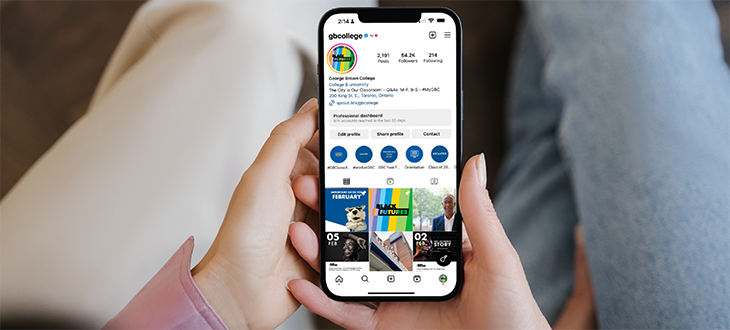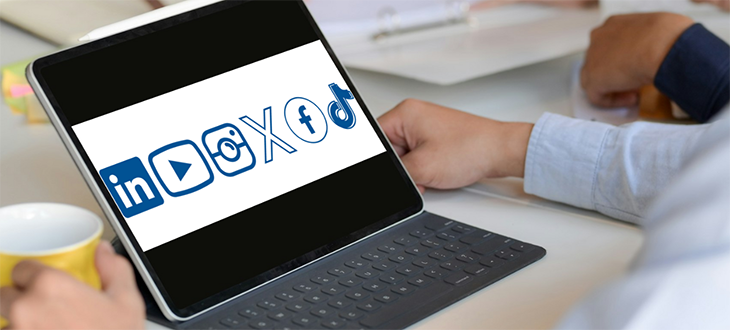1
Social Media Fundamentals
Social Media Fundamentals

The importance of social media
Did you know that 93% of internet users are those on social media and that over 4.74 billion people across the world use it regularly? Now is the time to be active on social! Here we will dive into the importance of social media, but first, let's go back to the basics and review what it is and some of its key components.
What is social media?
Social media refers to a broad category of online platforms and technologies where users create, share and interact with content.
The Primary Platforms Include:
Facebook, X (formerly Twitter), Instagram, LinkedIn, TikTok and YouTube. Many other platforms are available globally.
At its core, social media is about facilitating connections and fostering conversations among individuals and communities.
What are the key components of social media?
While social media is comprised of several key components, these four remain true across the primary platforms.
- Profiles: Users and brands create profiles (on some platforms they’re called pages), which serve as their digital identity on the platform itself. Information such as name/brand name, photo/logo, a brief bio and other relevant information like website links are typically featured here.
- Content Sharing: To engage with their audiences, users, including people and brands alike, can share various content types such as text, images, videos or links on their profiles.
- Engagement: Other users of those platforms can then engage with the content by liking (called reacting on some platforms), commenting, sharing or watching. These interactions or "engagements" help gauge how content is performing, along with its popularity and impact on the community.
- Algorithms: If you've ever had content go "viral," most of the time you can thank the platform's algorithm. Each platform has a complex set of rules and data which essentially determine what content users see in their feeds. The overall purpose of the algorithm is to understand the types of content you are engaging with and to tailor future content to a user's interests and behaviours. This is why on most platforms, you’ll usually see content from accounts you follow as well as suggested accounts.
Importance of social media in the digital landscape
In today's digital-first era, social media has reshaped the way we interact, communicate and engage with the world around us. From connecting people around the world, to driving information dissemination, and even nurturing one's personal growth, social media is the driving force behind a new age of global connectivity and engagement. Let's explore the factors that make social media leader in today's digital revolution.
- Communication and connectivity: Social media bridges geographical gaps, enabling people worldwide to connect and communicate effortlessly. It has redefined how individuals and businesses interact with their audiences, thus fostering global communities. For example, prospective international students can get a glimpse into the GBC brand and lifestyle by interacting with our posts across platforms.
- Information dissemination: Social media platforms serve as vital information channels, providing real-time updates on news, events and trends. They have played a pivotal role in shaping public opinion and facilitating social movements.
- Business and marketing: Social media has become a primary channel for businesses to promote their products and services. It allows companies to reach a vast audience, engage with customers and build brand loyalty.
- Personal branding: Individuals can use social media to showcase their skills, talents and expertise. Building a personal brand on social media has become essential for career development and networking in many industries.
- Entertainment and content creation: Social media platforms are also hubs for entertainment, with users sharing a wide range of content, from jokes to informative videos. Content creators can reach massive audiences and even turn their hobbies into careers if their work generates enough engagement to turn into compensation.
Whether you're leveraging social media to build your personal brand or to help promote your college department, it's evident that these platforms have become indispensable tools in our digital toolkit. In a world where connectivity and information dissemination are paramount, social media offers us the means to bridge gaps, amplify our voices and make meaningful connections on a global scale.

Platforms most widely used by the GBC community
Social media channels
Social media presents an extraordinary opportunity to enhance the online visibility of your program, event or department. If you're just beginning to venture into the realm of social media and are enthusiastic about establishing your GBC-affiliated presence, we suggest beginning with a modest approach and identifying the ideal platform to help increase your exposure. Uncertain about which platform suits your needs? Let's examine the most widely used social media channels at the college in greater detail.
| Channel | TikTok | YouTube | ||||
|---|---|---|---|---|---|---|
| Channel focus | News, groups/communities | News sharing, company stories, discussion | Creative/lifestyle platform, through photo and videos | Industry news | Trending video content | Educational video content |
| Content types that work | Photos, videos, article links | Opinions, real time updates photos, videos, links | Photos, vertical videos, and stories (ephemeral content) | Links, thought leadership blogs, videos | Short form ( less than 1 minute) | Longer form videos |
| Core audiences | Students, family of students | Stakeholders, government, partners faculty, students | Students and prospective students | Employees, graduates stakeholders, industry professionals | Videos only students and prospective students | Students, stakeholders, partners, faculty |
| Challenge | Limited reach, hard to build a following | Concise messaging, short content lifespan | Limited linking abilities | Lower engagement and interaction | Posting consistency video content is a large investment | Posting consistency video content is a large investment |
| Time commitment | Low - med | Low - med | Med - high | Med - high | High | High |

Benefits and challenges for personal and professional purposes
Social media is an exceptional tool that enables brands and users to easily share information, drive audience connection and measure their online success. Although it offers boundless opportunities, individuals and businesses aspiring to leverage these platforms must remain mindful of its potential risks. Let's explore both the benefits of tapping into these platforms, along with the possible risks.
Benefits of social media:
| Benefit: | Personal level | Professional level |
|---|---|---|
| Connectivity and networking | Individuals can connect and stay connected with those who are important to them, regardless of location. | Professionals can network and expand their connections with colleagues/mentors, opening doors to career paths and opportunities. |
| Information and awareness | Users can stay informed by getting real-time updates on news, events and trends. | Professionals can stay updated on industry news and market trends, further enhancing their knowledge. |
| Branding and promotion | Individuals can build their personal brands by sharing their expertise or thought leadership, potentially leading to personal growth and the development of a social community that exceeds beyond their friends and family. | Businesses can use social media for marketing, reaching a variety of audiences, engaging with members of their communities while also building brand loyalty. For Example, GBC could look to reach and connect with current and prospective students, alumni, faculty, employees and partners. |
| Learning and education | Social media platforms offer educational content, tutorials, and discussions, facilitating self-improvement and skill development. | Professionals can access valuable industry insights, webinars, and online courses to enhance their expertise. |
Challenges of Social Media
| Challenge | Personal level | Professional level |
|---|---|---|
| Data and privacy concern | With social media being "social" in nature, users may inadvertently share personal information or details leaving them vulnerable to a breach in privacy. | Businesses must exercise responsible handling of customer data to avert data breaches. |
| Information overload | Excessive social media use can result in information overload, negatively impacting mental well-being. | Professionals must sift through extensive information to identify pertinent content. |
| Reputation management/issues | With social media moving at a very rapid pace, users can easily find themselves either sharing information that can lead to | Brands can be impacted by their employees sharing opinions or partaking in activities that are in conflict with a brand's values or stance, leading to reputational issues or even potential crisis. |
| Misinformation and disinformation | Users may encounter erroneous or deceptive information on social media platforms. | Businesses and professionals must exercise caution when relying on social media for information, emphasizing the importance of fact-checking. |
In summary, social media extends an array of advantages for personal and professional advancement, yet it simultaneously presents challenges concerning privacy, information management and online conduct. Thoughtful management of social media usage empowers individuals and businesses to harness its benefits while prudently accessing potential risks.
